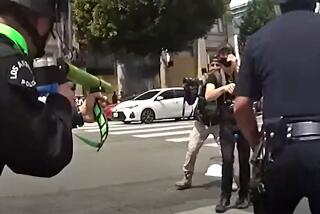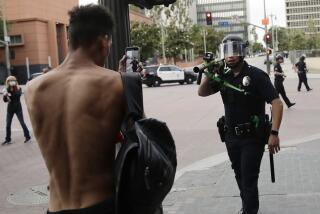LAPD Units to Test Spray as Alternative to Baton Use : Law enforcement: In the wake of the King beating, department will try substance to limit injuries during arrests. It contains a form of an irritant found in taco sauce.
- Share via
Reacting to public outrage over the baton beating of Rodney G. King, the Los Angeles Police Commission on Tuesday approved outfitting the entire patrol force and undercover officers with a new chemical irritant spray for a trial period in the hope that unruly suspects can be taken into custody without serious injuries.
The spray, a chemical agent called oleoresin capsicum, is similar to tear gas, police said. But unlike tear gas, which can disperse in the air and irritate police and bystanders, the new device reportedly disables only the person who is sprayed.
Cmdr. Michael Bostic, the department’s use-of-force expert, told the commission that a form of the irritant, which is an ingredient in taco sauce, was used by the Chinese military in the 15th Century. Bostic said the agent has been used increasingly in the last decade as U.S. police departments have sought new ways to arrest combative suspects without resorting to deadly force.
It drastically affects the mucous membranes in the face and “shuts down” the eyes, nose and throat, said Bostic, who was assigned to find alternative police tools in the wake of the King beating.
Bostic said that as a test he had a police officer in Texas spray him with the agent. Bostic said he was debilitated for almost an hour.
“You can’t breathe,” Bostic said. “You can’t see. You kind of go into hyperventilation. It’s so restrictive, it’s scary. It’s a complete medical disorientation.”
Under the testing plan, 4,630 officers assigned to uniform patrol, vice units and narcotics enforcement units will be carrying the device until police officials are satisfied with the results.
Bostic and Chief Willie L. Williams said 500 officers tested the new spray on their beats earlier this year and found it an acceptable alternative to the baton in about 45 arrests that might have otherwise escalated into deadly force incidents. They found it to be particularly effective with suspects who were drunk, under the influence of drugs or apparently insensitive to pain.
“In one incident, officers used OC to disperse a group of violent gang members,” the chief told the Police Commission. “It was the opinion of the supervisor at the scene that if OC had not been used, there would have been numerous injuries to suspects and officers.
“The officers would have had to use their batons and come in physical contact with the violent gang members who had attacked officers. After the group dispersed, officers recovered discarded firearms dropped by the fleeing gang members.”
Officials said an FBI study of the chemical agent found that it was safely applied by law enforcement officials in about 900 incidents in which suspects resisted arrest. And Bostic said that in Tampa, Fla., where officers have begun using the oleoresin capsicum almost exclusively, police use-of-force incidents have been reduced by about 72%.
“That, to me, is encouraging,” Bostic said.
In the Los Angeles Police Department, officials have searched for an alternative to the baton, particularly in the aftermath of the King beating.
Officers were once allowed to use a chokehold to disable suspects, but the technique was banned after questions arose about suspects’ deaths and officials became alarmed by a rise in lawsuits.
The officers who were later acquitted in the King beating said they would not have used their batons if they had been allowed to use the chokehold or had some other use-of-force alternative, such as the chemical spray.
Some special interest groups in Los Angeles, who have criticized the LAPD over the King beating, said they wanted to see how the new spray works before passing judgment.
“We are going to wait and see what happens,” ACLU spokesman Allan Parachini said.
But he added that his organization will object if the substance is used primarily against minorities.
In other actions, the Police Commission approved Williams’ reorganization plan, which consolidates police intelligence functions and realigns such programs as community and press relations.
Williams said his plan should free about 100 officers to return to patrol duties by January. Williams also said he plans to appoint new bureau commanders within 10 days.
More to Read
Sign up for Essential California
The most important California stories and recommendations in your inbox every morning.
You may occasionally receive promotional content from the Los Angeles Times.











